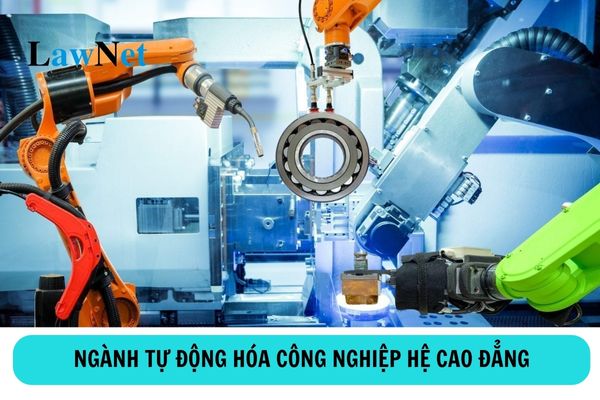What can graduates of the industrial automation program at the college level do after graduation in Vietnam?
What can graduates of the industrial automation program at the college level do after graduation in Vietnam?
Based on subsection 5 Section A Part 7 Regulations on minimum knowledge volume, competency requirements that learners must achieve after graduating from intermediate level, college level for electrical engineering, electronics, and telecommunications disciplines (hereinafter referred to as the Regulations) issued with Circular 48/2018/TT-BLDTBXH, college-level students majoring in industrial automation can perform the following jobs:
- Install automatic equipment and systems;
- Operate and supervise automatic systems;
- Maintain and repair automatic equipment and systems;
- Provide technical consultation and business for automatic equipment;
- Design, execute, and program controls using microcontrollers (embedded systems);
- Design, execute, and program controls using industrial controllers;
- Install, program, and operate industrial robots.

What can graduates of the industrial automation program at the college level do after graduation in Vietnam? (Image from the Internet)
What are regulations on the industrial automation program at the college level in Vietnam?
Based on subsection 1 Section A Part 7 Regulations issued with Circular 48/2018/TT-BLDTBXH, the college-level industrial automation major is defined as follows:
College-level industrial automation is a field where practitioners design, manufacture, and install automated production lines; apply specialized software to program control, monitor, and manage production systems to increase labor productivity, improve product quality, and free humans from hazardous environments, meeting level 5 requirements in Vietnam's national qualifications framework.
Industrial automation practitioners will participate in research, design at technology solution providing companies, consult in design, or work at companies executing and installing production lines; or directly operate and maintain automated production lines in factories.
Additionally, practitioners may also work as sales consultants, customer support for companies specializing in providing automatic equipment.
To practice, workers must have good health and professional ethics, adequate professional knowledge and skills commensurate with job positions, proactively perform and solve tasks, communicate and coordinate work in teams, organize and manage the production process, and train and guide lower-level workers.
Minimum knowledge volume: 2,365 hours (equivalent to 84 credits).
What are the knowledge requirements for college-level industrial automation students in Vietnam?
Based on subsection 2 Section A Part 7 Regulations issued with Circular 48/2018/TT-BLDTBXH, college-level industrial automation students must meet the following knowledge requirements:
- Present principles and standards to ensure electrical safety for people and equipment;
- Present methods of measuring electrical and non-electrical devices;
- Explain the functions, operating principles, and applications of various motors, sensors, basic electronic circuits; measuring devices, programmable control units (PLC, microcontroller), specialized controllers, electro-pneumatic control systems, switching and protection devices such as: relays, contactors, sensors, etc.;
- Explain the methods of installing industrial automation equipment;
- Describe control programming methods for sequential, parallel, random processes;
- Present the operating principles, functions, and programming methods for industrial robots;
- Classify different industrial communication protocols;
- Analyze basic industrial control algorithms: ON/OFF, PID;
- Explain the significance of common settings in industrial controllers;
- Understand symbols and conventions in technical drawings and electrical diagrams according to IEC standards;
- Present inspection, maintenance, and adjustment procedures for automatic control systems;
- Explain labor safety rules, industrial hygiene, and fire-explosion prevention;
- Analyze technical consultation and business processes for automatic equipment;
- Present basic knowledge of politics, culture, society, law, national defense and security, and physical education as required.
What skills are required for college-level industrial automation students in Vietnam?
Based on subsection 3 Section A Part 7 Regulations issued with Circular 48/2018/TT-BLDTBXH, college-level industrial automation students must meet the following skill requirements:
- Understand symbols and conventions in technical drawings and specialized electrical diagrams according to IEC standards;
- Calculate, select, and check the operating status and usage of various motors, sensors, basic electronic circuits, measuring and control devices, pneumatic/hydraulic actuators, intermediate devices like relays/contactors...;
- Proficiently use specialized software to calculate, design circuit diagrams and assemble basic electronic circuits; design wiring diagrams connecting controllers to peripheral devices;
- Install, configure parameters, and operate devices, electrical cabinets/boards, production lines, and automation systems;
- Proficiently use common specialized tools;
- Program control systems using digital controllers: PLC, microcontroller...;
- Program basic motion control applications of robotic arms;
- Program control interfaces on HMI;
- Maintain and repair automatic equipment and systems;
- Provide technical consultation for customers in the automatic equipment business;
- Organize and implement labor safety measures, environmental sanitation, and fire-explosion prevention in the installation, repair, maintenance, and calibration of equipment in automatic control systems as prescribed by law;
- Utilize basic IT technology as prescribed; exploit, process, and apply IT in professional work;
- Use basic foreign languages, achieving level 2/6 in Vietnam's foreign language proficiency framework; apply foreign languages to professional work.

